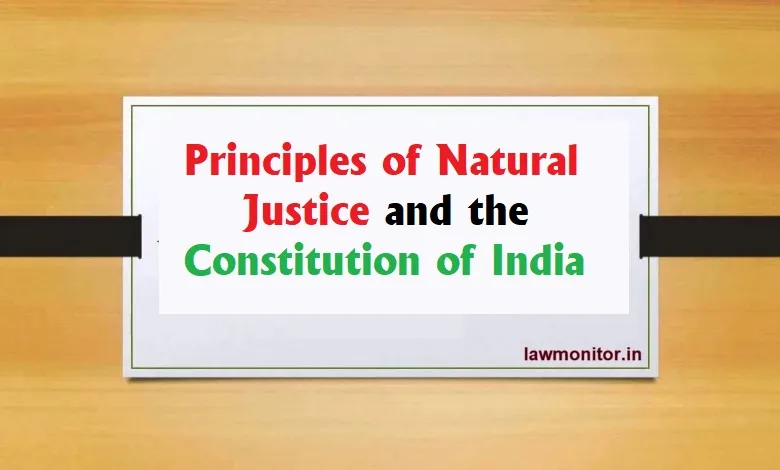Administrative Law Notes: This article explores the integration of the principle of natural justice within the Indian Constitution, focusing on Articles 14 and 21.
Natural Justice in the Indian Constitution:
The Indian Constitution integrates the principle of natural justice, which is evident in various articles and judicial interpretations.
Article 14 of the Constitution guarantees equality before the law and equal protection of the law, preventing discrimination. This article embodies the principle that every person should be treated equally and without discrimination.
Judicial Interpretations of Article 14:
- In Delhi Transport Corporation v. DTC Mazdoor Union, the Supreme Court held that the principle of audi alteram partem (the right to be heard) is intrinsic to Article 14 and applies to both quasi-judicial and administrative actions unless explicitly excluded by law.
- The case of Maneka Gandhi vs Union of India reinforced that Article 14 includes elements of natural justice, thereby assuring equality as per the Constitution.
- In Cantonment Board, Dinapore vs Taramani Devi, the court affirmed that the audi alteram partem rule is a critical component of Article 14.
Article 21 and Natural Justice:
- Article 21 provides the right to life, and the phrase “procedure established by law” is interpreted to include the principles of natural justice.
- Justice Bhagwati emphasized that reasonableness, an element of equality and non-arbitrariness, is pervasive in Article 14 and should guide the application of Article 21 to ensure fairness and justice, free from arbitrary or oppressive actions.
Application of Natural Justice in Income-Tax Proceedings:
- The principles of natural justice must be adhered to during income-tax proceedings, as these are quasi-judicial in nature.
- In Suraj Mall Mohta and Co. v. A. V. Visvanatha Sastri, the Supreme Court ruled that assessment proceedings are judicial in nature, and all procedural rights, including the right to inspect records, must be observed.
- The Dhakeshwari Cotton Mills Ltd. v. CIT case emphasized that all relevant documents must be shown to the assessee, ensuring that they have an opportunity to contest any evidence.
- Similarly, in Gargi Din Jwala Prasad v. CIT, the court held that the revision power under the Wealth Tax Act is quasi-judicial, requiring the Commissioner to decide impartially and follow natural justice principles.
Key Judicial Observations:
In Sirpur Paper Mill Ltd. v. CWT, the Supreme Court highlighted that decisions must be made impartially, based on disclosed facts, and without influence from external authorities, reinforcing the application of natural justice in administrative actions.
References
- “The State shall not deny to any person equality before the law or the equal protection of the laws within the territory of India.”
- Article 14, Constitution of India
- Delhi Transport Corporation v. DTC Mazdoor Union
- 1991 AIR 101, 1990 SCR Supl. (1) 142
- Maneka Gandhi vs Union of India
- 1978 AIR 597, 1978 SCR (2) 621
- Cantonment Board, Dinapore vs Taramani Devi
- 1974 96 ITR 97 All
- “No person shall be deprived of his life or personal liberty except according to a procedure established by law.”
- Article 21, Constitution of India
- Suraj Mall Mohta and Co. v. A. V. Visvanatha Sastri
- [1954] 26 ITR 1 (SC)
- Dhakeshwari Cotton Mills Ltd. v. CIT
- [1954] 26 ITR 775 (SC)
- Gargi Din Jwala Prasad v. CIT
- [1974] 96 ITR 97 (All.)
- Sirpur Paper Mill Ltd. v. CWT
- [1970] 77 ITR 6 (SC)
Read Previous: Judicial Control of Administrative Discretion- Delegation of Discretion
Read Next: Rule Against Bias- Short Notes



